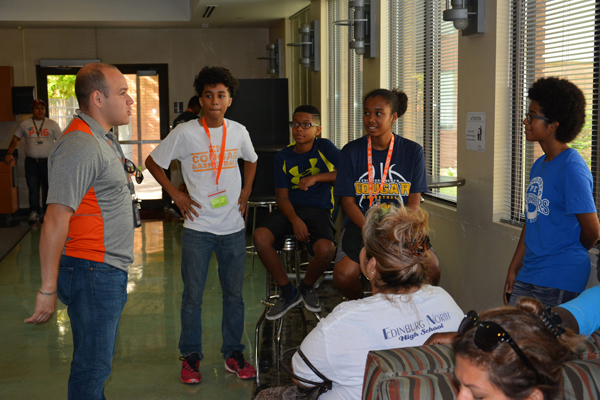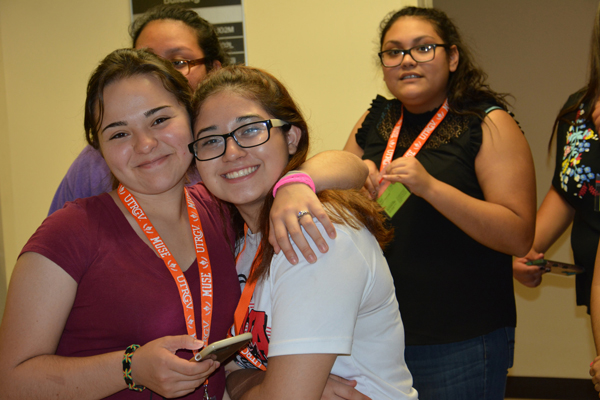- La Feria Community Holds Succesful Business Mixer Event
- Little Nashville to Take Place in Downtown Mercedes
- Lions Basketball Captures District Gold
- La Feria ISD Students Compete in Regional Chess Tournament
- Lions End First Half of 32-4A on a High Note
- La Feria ISD Held Another Successful Parent Conference
- Strong Appearance for Lions at Hidalgo Power Meet
- LFECHS Students Get to Meet Local Actress
- Students Participate in Marine Biology Camp
- Two LFECHS Students Qualify for All-State Band
UTRGV’s MUSE Programs Strive to Help Migrant Students Understand the Potential of Higher Education
- Updated: July 13, 2018

UTRGV P-16 Outreach kicked off its Migrant University Summer Experience (MUSE) program in June with the students moving into UTRGV dorms. MUSE programs offers migrant students from across the Valley a chance to experience college life and further their education. Under the six-week program, students enroll in classes, receive on-campus housing and a meal plan, have access to select campus facilities, go on field trips and job shadow. UTRGV Courtesy Photo
by Amanda L. Alaniz
RIO GRANDE VALLEY, TEXAS – “We came in as strangers, we left as brothers.”
The beginning of June was move-in day for high school migrant students enrolled in The University of Texas Rio Grande Valley’s Migrant University Summer Experience (MUSE) program.
The students are from around the Valley and most are complete strangers to one another. But they all are on a similar journey to success.
UTRGV P-16 Outreach spearheads the 11-year-old program, which gives migrant students a chance to experience college life, and further their education.
Under the program, students enroll in classes, receive on-campus housing and a meal plan, have access to select campus facilities, go on field trips and job shadow.
Barbara Jean Garza, director of UTRGV’s P-16 Outreach, said the program is six weeks during the summer and typically serves more than 100 migrant students. The selection process for students to attend the camp begins with recommendations from school counselors, and relies on the discretion of the school districts.
“The schools identify students who would be eligible for the program. We provide the service as far as the application portal; we review all the documents for the schools,” Garza said. “The schools lets us know which students would be a good fit to be part of the residential program.”
There is a fee for each student to be enrolled in the MUSE program. Participating school districts cover those fees for their students, so families do not have to worry about the cost.
“Nothing comes from the families. We tell them it is a free opportunity for the families to get this experience. I know the parents are extremely grateful for this,” Garza said.
There are two tracks under the MUSE program – a high school track and a dual-enrollment track. The student’s school will help determine which track best suits the student and which courses they could take. In the end, they can receive two high school credits or six college credit hours.
The students also receive a living allowance of $1,200 that is dispersed in increments to them throughout the program. Garza said students receive the full amount if they complete the program.
A variety of fun activities and events are planned for the students throughout the program, almost mimicking UTRGV’s Student Union events schedule. The students go on a college tour across the state toward the end of the program.
Garza said a significant percentage of MUSE students do enroll at UTRGV after graduation; some even come back to work in the P-16 office.
UTRGV senior Anthony Rivera said he heard about the MUSE program as a junior in high school from his migrant counselor. He was hesitant about talking to his mother about the program, he said, thinking she wouldn’t agree to it.
“I went home and told my mom, ‘There’s this really good opportunity but I don’t know.’ She asked what it was and I said it was MUSE. She asked, ‘Is that the program where you stay at the dorm and take classes?’ I told her yes. And she responded, ‘Where do I sign,’” Rivera said.
The mass communications major enrolled in the dual-enrollment track and took college algebra and astronomy courses. He currently is working for P-16 Outreach as the digital media marketing manager.
Rivera said his MUSE experience was unforgettable, and he hopes future MUSE students do not take the opportunity for granted.
“It’ll help them grow,” he said.
To learn more about the MUSE program, contact Garza at barbara.garza@utrgv.edu or call (956) 665-7597.



